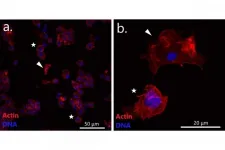New COVID-19 research: How to make people follow restrictions without appealing to fear
"Many countries are hit by a third wave of infections and authorities may be tempted to induce fear to make people follow guidelines. Our findings provide policy makers with an alternative." - Michael Bang Petersen, professor, Aarhus University, Denmark
2021-03-30
(Press-News.org) Making people fear the coronavirus may motivate us to wash our hands, keep our distance and wear a face mask. But fear also takes a heavy toll on our mental health and is fertile ground for discrimination and prejudice. New research shows a different path.
When the coronavirus pandemic hit the world in the spring of 2020, feelings of being capable or efficacious against the virus were a key factor in driving compliance with the authorities' guidelines. This is the result of a new study based on large surveys across eight Western democracies, published in British Journal of Health Psychology.
The extent to which we personally felt informed and capable of acting clearly affected the extent of our behaviour to prevent infection, e.g. by keeping our distance and refraining from handshakes.
"These are important findings because they show a pathway to public compliance with pandemic health advice which is not driven by personal fear. Today, in the spring of 2021, many countries are hit by a third wave of infections and authorities may be tempted to induce fear to make people follow guidelines. Our findings provide policy makers with an alternative," says Michael Bang Petersen, one of three authors behind the study, and a professor of political science at Aarhus University, Denmark.
Tell us what to do, and we will do it
In fact, the study shows that when people feel capable of handling the crisis, the impact of fear is no longer important. Those who feel efficacious comply with the authorities' guidelines regardless of whether they are worried about the health of themselves and their families. And they also comply regardless of whether they trust their government and their fellow citizens.
"Our study shows that in the first stage of the pandemic, a sense of urgency emerged and made people put aside individual considerations and political differences. This sense caused people across the world to say: 'Tell us what to do, and we will do it,'" says Professor Michael Bang Petersen.
26,000 participants from the UK, the USA and six EU countries
The study is based on representative surveys conducted in Denmark, France, Germany, Hungary, Italy, Sweden, the United Kingdom and the United States of America. A total of 26,508 people participated from March to May 2020 as the early events were unfolding.
"The study provides a unique insight into behaviour during the first wave of an unprecedented crisis, which we can utilise both in the present and in the long term. Often, decision-makers are worried that the population will panic. But our data shows that authorities do not need to fear this. Instead, they should tell people as clearly as possible about the actual challenges and how people should act," Michael Bang Petersen concludes.
INFORMATION:
The new findings are part of a large-scale data-driven research project entitled HOPE - How Democracies Cope with COVID-19. The project is financed by the Carlsberg Foundation and headed by Professor Michael Bang Petersen. He co-authored the study with Frederik Jørgensen and Alexander Bor, two fellow researchers at the Department of Political Science at Aarhus University.
Contact:
Michael Bang Petersen, professor of political science and head of the HOPE project
Aarhus BSS, Aarhus University
Email: michael@ps.au.dk
Twitter: @M_B_Petersen
Phone: +45 2077 5944
[Attachments] See images for this press release:

ELSE PRESS RELEASES FROM THIS DATE:
2021-03-30
A team of researchers at the Technical University of Munich (TUM) has developed a new early warning system for vehicles that uses artificial intelligence to learn from thousands of real traffic situations. A study of the system was carried out in cooperation with the BMW Group. The results show that, if used in today's self-driving vehicles, it can warn seven seconds in advance against potentially critical situations that the cars cannot handle alone - with over 85% accuracy.
To make self-driving cars safe in the future, development efforts often rely on sophisticated models aimed at giving cars the ability to analyze the behavior of all traffic participants. But what happens if the models are not yet capable of handling some complex ...
2021-03-30
Drinking beetroot juice promotes a mix of mouth bacteria associated with healthier blood vessels and brain function, according to a new study of people aged 70-80.
Beetroot - and other foods including lettuce, spinach and celery - are rich in inorganic nitrate, and many oral bacteria play a role in turning nitrate to nitric oxide, which helps to regulate blood vessels and neurotransmission (chemical messages in the brain).
Older people tend to have lower nitric oxide production, and this is associated with poorer vascular (blood vessel) and cognitive (brain) health.
In the new study, by the University of Exeter, 26 healthy older people took part in two ten-day supplementation periods: one with nitrate-rich ...
2021-03-30
Increasing numbers of people in Belgium are turning away from meat in favour of plant-based alternatives, according to new research from psychologists at the University of Bath, in collaboration with Belgian animal welfare organisation GAIA.
New analysis finds that in 2020, over half of Belgians (51%) were 'satisfied' with meat alternatives - a figure that has increased from 44% since 2019.
The results of the research which gauged responses from a representative sample of 1,000 people in Belgium over two years (in 2019 and 2020) highlights concerns around animal agriculture and the environment that are impacting individuals' dietary choices.
Additional findings from ...
2021-03-30
Computer scientists at the University of Surrey have created a ground-breaking model that could improve our understanding of developmental disorders such as autism.
Scientists have long tried to better understand how the cerebral cortex and its layers develop, with pathologies such as autism, schizophrenia and epilepsy linked to this process.
In a paper published by the journal Cerebral Cortex, scientists from Surrey, Newcastle University, and Nottingham University detail how they developed and used a computational model to simulate cell division, cell migration and apoptosis (cell death) in the hope of understanding how these processes affect the development of the brain.
With the help of their computer model, the ...
2021-03-30
A study examining bean productivity among smallholder farmers in Tanzania, has found that on average, yields are 6% lower among female than male farmers. Women are often 'invisible' in agriculture, researchers say, due to social structural barriers and national agricultural policies, which do not address discriminatory land rights; education and agricultural information and decision making, which must be tackled to reverse this trend.
The paper 'What Does Gender Yield Gap Tell Us about Smallholder Farming in Developing Countries?' published in the open access scientific journal Multidisciplinary Digital Publishing (MDPI), analyzed data from southern region in Tanzania since 2016 and also drew on research ...
2021-03-30
'A transmissible cancer was first discovered in dogs in the middle of the 19th century. It is transmitted sexually from a sick dog to a healthy one, the cancer cells themselves being the infective agent. In the 1990s, a contagious cancer was discovered in the Tasmanian devil. Since the cancer was found in only two species of mammals, scientists used to think that it is quite rare in the nature. However, time has come to reconsider this view. A transmissible cancer appears to be fairly widespread among bivalve molluscs,' says Maria Skazina, a research associate at the ...
2021-03-30
DALLAS - March 30, 2021 - UT Southwestern researchers have identified factors that put patients with childhood-onset lupus at elevated risk for poor outcomes, such as end-stage renal disease or death, as they transition from pediatric to adult health care. The findings, published online in Seminars in Arthritis and Rheumatism, emphasize the precarious nature of this period and shine a spotlight on areas prime for intervention to help protect these vulnerable patients.
Patients with chronic diseases that used to be fatal early in life now often survive to live long lives. However, says study senior author END ...
2021-03-30
Babies can recognise combinations of words even before they have uttered their first word, a study suggests, challenging ideas of how children learn language.
Assessments in 11-12 month-olds show that infants at the cusp of talking are already processing multiword phrases such as 'clap your hands'.
Researchers say the study is the first to provide evidence that young children can pick up and understand multiword sequences before they can talk or begin producing such combinations themselves.
The findings suggest that babies learn individual words and more complex phrases at the same time, which challenges the perspective that they progress from single words to phrases and sentences, experts say.
It may also explain why adults who learn a new language in later life ...
2021-03-30
The first online advertisement was a banner for AT&T that appeared on the HotWired.com website in 1994, when there were just 30 million internet users worldwide. Today, 57% of the world's population has access to the internet and advertising technology has advanced to the point that by 2018 the digital advertising market in Europe alone was worth 55 billion euros. Of this amount, 16.8 billion euros is accounted for by programmatic advertising, which uses artificial intelligence to automate much of the buying and selling of internet advertising.
A new report, published by Open Evidence, a ...
2021-03-30
Water quality management in the ocean often targets visible pollution sources such as sewage, rivers or ships. A new global study, led by researchers at the University of Gothenburg, reveals that invisible groundwater discharges may be just as important driving nitrogen into coastal waters.
As we enter the United Nations' Decade of the Oceans, a new research study shed light on an often overlooked source of impact on the coastal ecosystems.
The study, which examined groundwater discharges at more than 200 locations worldwide, showed that groundwater is the major source of nitrogen and phosphorus to the ocean at many locations, including some areas in the Baltic Sea.
"Groundwater is essentially invisible and difficult to investigate. That ...
LAST 30 PRESS RELEASES:
[Press-News.org] New COVID-19 research: How to make people follow restrictions without appealing to fear
"Many countries are hit by a third wave of infections and authorities may be tempted to induce fear to make people follow guidelines. Our findings provide policy makers with an alternative." - Michael Bang Petersen, professor, Aarhus University, Denmark




